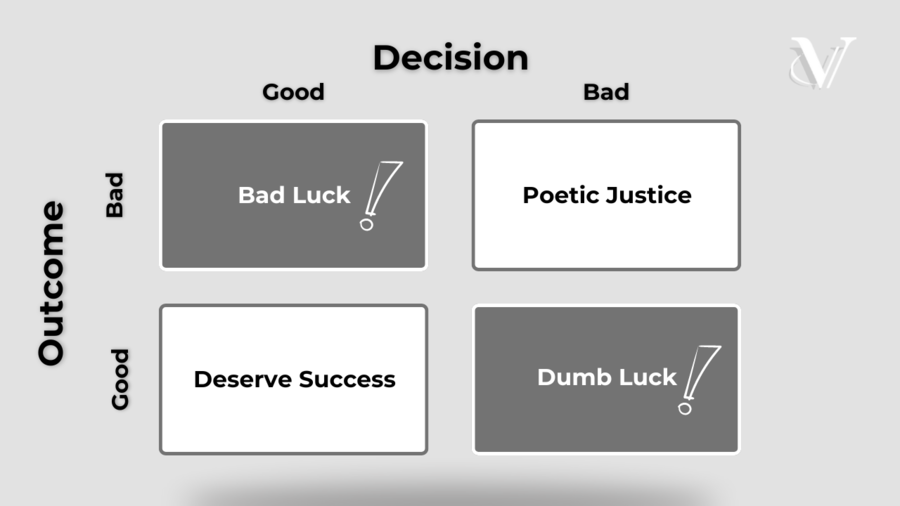Introduction
Outcome bias is a psychological phenomenon in which we evaluate a decision based on its outcome rather than the quality of the decision-making process itself. It is crucial to understand this as it can affect our daily and professional choices. We often focus on the end result, ignoring the path that led to it and overestimating the validity of decisions based on their success or failure.
This can lead to a distorted analysis of past situations and a lack of learning from mistakes. Understanding outcome bias helps us make more informed and rational decisions, allowing a more accurate assessment of our actions and the consequences that come with them.
When the Result Obscure Rationality
Rationality is the ability to make decisions based on logic and reasoning. However, the outcome bias can obscure this process. Being influenced by outcomes, we can overestimate decisions that have led to positive results and underestimate those that have had negative outcomes. This undermines our ability to objectively assess the quality of the decisions themselves.
Instead of carefully analyzing the decision-making process, we focus solely on the final results, leading to a distorted judgment on the rationality of our actions. Thus, outcome bias can hinder our ability to act rationally and inform our future choices.
The Causes of Outcome Bias
Outcome bias, a complex psychological phenomenon, has deep roots in the ways in which we perceive and judge the world around us. One of the main causes is the human tendency to look at the past with a retrospective perspective.
When we look at past events, we have a tendency to overestimate our ability to predict outcomes, neglecting random factors or information not available at the time of the decision. In addition, the emotionality of past experiences plays a significant role in influencing the way we evaluate our decisions. Emotionally charged events can distort our perception of outcomes, leading us to give more importance to positive or negative outcomes than their real rational relevance.

The mental mechanisms that contribute to the outcome bias are many. One of them is decision-making influenced by knowledge of the result. When we are aware of the outcomes of a decision, we tend to reinterpret the decision-making process based on those outcomes.
This can lead to a retrospective review of the information available at the time of the decision, with the risk of overestimating or underestimating the quality of our initial decision. Moreover, judgment influenced by knowledge of the outcome can cause us to place more weight on the relevant elements that led to the final result, neglecting other factors that may have been equally significant.
The outcome Bias in everyday life
The outcome bias manifests itself in many situations of everyday life, as well as in more complex professional and decision-making contexts. For example, in the financial world, investors tend to evaluate their investment decisions based on the returns obtained, rather than the decision-making process used to select investments. If an investment leads to high profits, the investor may consider the decision to be rational and well thought out, even if it may have been made with little analysis or just by luck. On the other hand, if an investment leads to losses, the investor could label the decision as irrational, even if the investment strategy was solid and based on careful analysis.
Another example occurs in the medical context. A physician could judge the validity of a medical procedure on the basis of its outcomes for the patient, rather than on the basis of its effectiveness demonstrated through scientific research. If a procedure saves the patient’s life, it could be seen as valid and justified, although there is no solid evidence of its long-term success. On the other hand, if the patient dies after a procedure, the doctor may label the decision as incorrect, even if it was based on the best medical knowledge and practices available at the time.
Another example is gambling. A study conducted by Daniel Kahneman and Amos Tversky showed that people tend to evaluate gambling decisions based on outcomes, rather than the likelihood of success associated with each decision. This leads to a distorted assessment of the rationality of gambling decisions, prompting people to seek happiness in a simple gain that, in reality, hides a loss.
Think rationally
The outcome bias represents one of the many cognitive traps that can compromise our decision-making and our ability to objectively assess situations. It is important to recognize that the success or failure of an action does not necessarily reflect the quality of the decision itself.
Therefore, it is crucial to separate outcomes from decision-making analysis and learn to evaluate decisions based on their inherent rationality, regardless of outcomes. Overcoming outcome bias allows us to improve our ability to learn from mistakes, make more informed decisions, and ultimately achieve more positive results in the long run.





